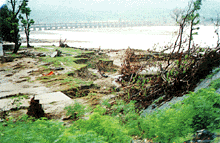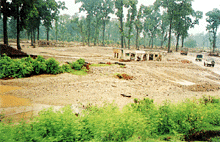For International Cooperation in Disaster Reduction and Response


Large-scale flooding caused serious damage in Nepal.
Ever since humankind appeared on Earth about one million years ago, people have confronted numerous natural disasters and, learning from these experiences, have concentrated their wisdom and efforts toward reducing the damage. Nevertheless, even today disasters still take many lives, destroy much property, and turn the fruits of development that people have built up so strenuously into nothing in an instant. The damage caused by natural disasters on a worldwide level is increasing year by year; the impact is especially serious in developing countries.
In Japan, the Great Hanshin-Awaji Earthquake struck in January 1995, wreaking the greatest damage in Japan for half a century and strongly reminding us once again of the importance of strengthening disaster reduction and response* measures.
In accordance with the spirit of the International Decade for Natural Disaster Reduction, designated by the United Nations, Japan is actively promoting international cooperation in this field.
In the Asia Natural Disaster Reduction Conference in Kobe, countries in Asia get together and discuss the common issue of how to formulate countermeasures to deal with such disasters as earthquakes, volcanic eruptions, and typhoons. The Conference offers an important opportunity to promote regional cooperation in the field of disaster reduction and response. This pamphlet has been compiled to introduce Japan's official development assistance in this field.
*The term "disaster reduction and response" here includes "emergency relief" and "reconstruction" as well as "disaster prevention."
![]() Japan's ODA Activities in Disaster Reduction and Response
Japan's ODA Activities in Disaster Reduction and Response
Back to Index
